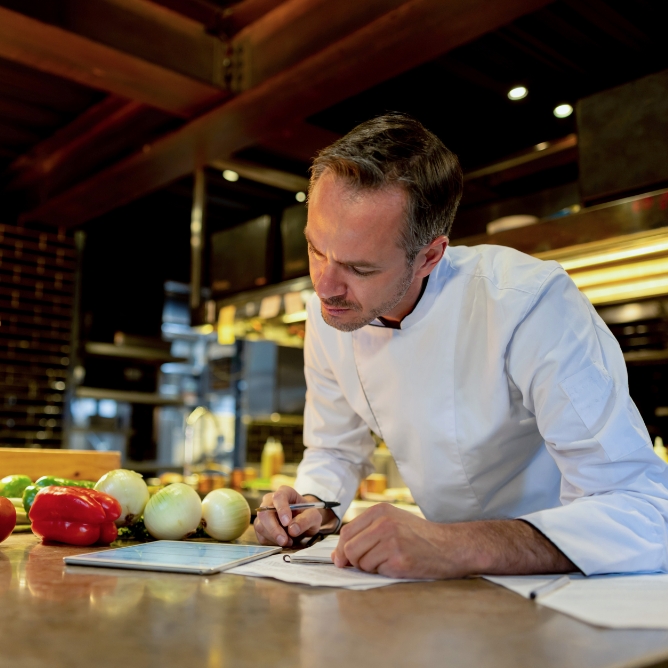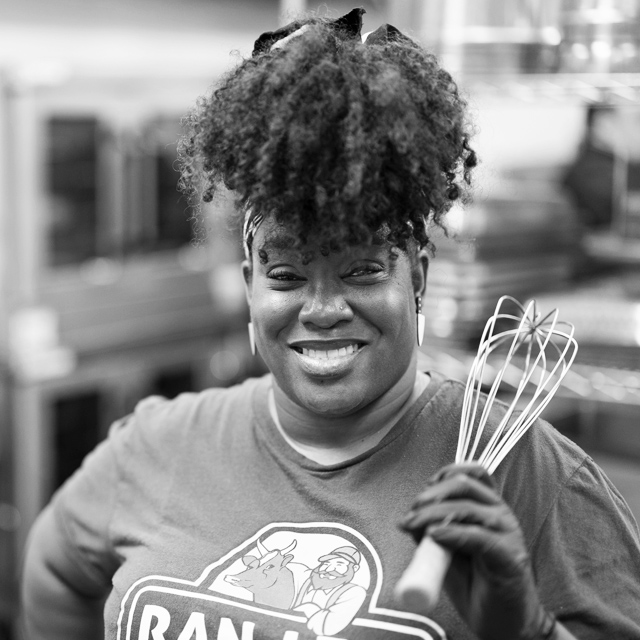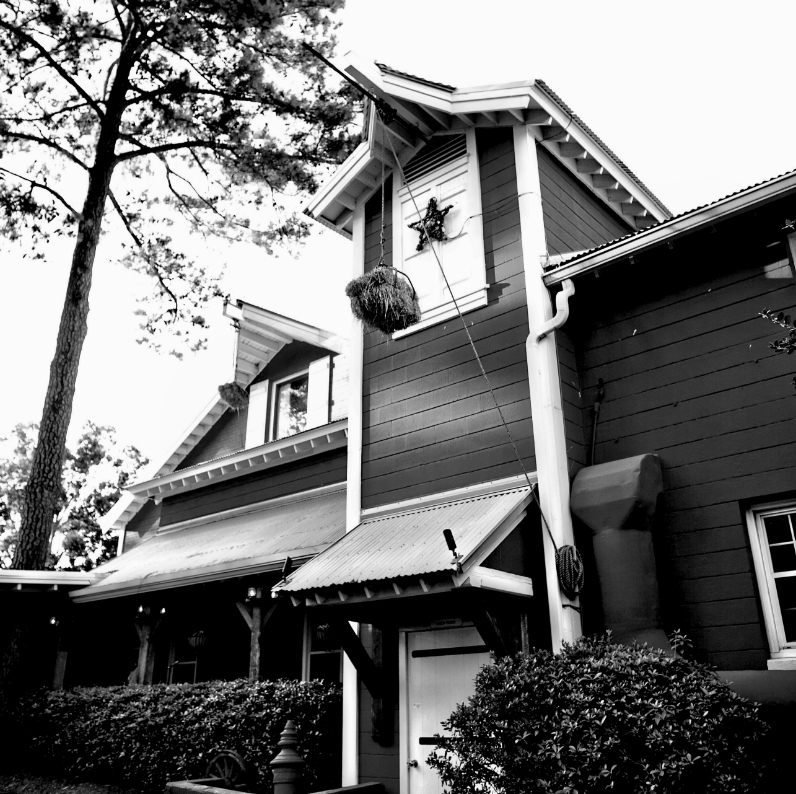Kevin
Cottrell &
Tal Blevins

Executive CHEF/Co-Founder &
OWNER, MACHETE
Cottrell’s career path
- Steamer
- Stage (Intern)
- Chef
- Executive Chef/Co-Founder
From Supper Club to Super-Popular: How MACHETE Got Its Start
A chef and a tech journalist met at a restaurant and bonded over food.
Nightly special
Sweet corn shortbread. Compressed cantaloupe. Whipped crème fraîche. Corn caramel. Lime popcorn meringue crumb. Vanilla-lime cotton candy.
The story behind some of the most innovative dishes in Greensboro begins with a chef who asked a customer how he liked a new dish.
Before opening MACHETE, a James Beard Best New Restaurant Semifinalist and Yelp Top 20 U.S. establishment, co-founder and Executive Chef Kevin Cottrell worked at another Greensboro restaurant. It was a cozy, intimate spot with a menu that tended to draw more adventurous diners. One night, Cottrell proudly presented a new menu item to diner Tal Blevins. He was the first customer to order the octopus dish. Later, Cottrell visited Blevins’ table, asking for feedback.
Blevins had traveled and sampled food from around the world through his job as a tech and video game journalist. The Greensboro native had just moved back home from San Francisco and was missing the cuisine he experienced in larger cities.
Excited to discuss the meal, he responded to Cottrell’s question enthusiastically.
It went something like this:
“Oh man, I loved it. I love this element, but I’ve had it like this. Have you tried it with this? Have you done this with it before?”
Cottrell didn’t say much.
“I just saw his face go, like, a little pale and dropped. And he walked away not saying anything,” Blevins recalls. “And I was like, ‘I just offended that dude. I feel so bad.’”
But Cottrell was processing the feedback and returned at the end of Blevins’ meal, wanting to talk more.
“He said, ‘I don’t get feedback like that very often in Greensboro, and I would love just to talk to you about food,” Blevins recalls.
The two hit it off and have been discussing food ever since.
Supper club gains following
Cottrell moved on from that restaurant, and around 2018, the duo began hosting supper club dinners at Blevins’ Greensboro home. His basement served as pantry and storage. Cottrell learned to cook in a much tighter, less commercial space, but they could experiment with ingredients and flavors that weren’t served elsewhere. Their events became increasingly popular and often sold out quickly.
When they decided to open MACHETE in 2020, they had already established an enthusiastic following.
Cottrell’s creativity and continuous drive to keep improving a dish inspires Blevins and draws his respect. He may change a dish within its first week on the menu or even after a few weeks of its launch, Blevins says.
“He’s an incredibly talented chef, but he also absorbs feedback, too,” Blevins says. “That’s often rare in the culinary world because a lot of chefs have a lot of ego, and Chef Kevin does not. Chef just wants to be creative and also to spark interest and spark ideas and inspiration through suggestions and other people.”

Humble beginnings
Today, Cottrell’s menus might highlight entrees like cold-smoked American wagyu steak or braised pork cheeks. But his journey toward experimenting with kohlrabi or caviar started humbly as “the steamer guy” at Bimini’s Oyster Bar and Seafood Cafe.
He felt at home there from his very first shift. He loved the chaos of it all and the camaraderie. After a couple of years there, he joined the kitchen staff at a fine dining restaurant with a French menu. The first thing he noticed walking into that restaurant was the way it smelled. That aroma of rich stocks marinating and the overall fragrance of a fine dining restaurant that was much different from the deep-fried seafood he was accustomed to.
His time there further reinforced his desire to keep learning and advancing his culinary skills.
He learned about an opportunity to stage (pronounced “stodge,” derived from the French word stagiaire, meaning trainee, apprentice, or intern) with Michelin-starred chefs in Chapel Hill. Staging is an unpaid internship in which a cook or chef works briefly in another chef’s kitchen to learn new cuisines and techniques.
His stage led to a job there, which was hugely transformative. That was the springboard for sparking his imagination and expanding the scope of his creativity.
“It changed my mind and opened my eyes to what was possible out there,” Cottrell says.
Belvins’ career path
- Pizza Delivery Driver
- BusBoy
- Cook
- Tech Journalist
- Restaurant Owner

Pro tips Q&A
Interested in joining a restaurant staff? Cottrell and Blevins share some tips about how to break into the business.
Q: Do you need a lot of experience to work in a restaurant like MACHETE?
TB: Actually, we found a lot of people who have been more classically trained are a little more set in their ways. And since we’re so creative-driven, it really is, I think, much more important to be both creative and a hard worker. Show that you actually want to be there and don’t be a complainapus. I would rather have people who are passionate and who want to work.
Q: Can you be an introvert or neurodivergent and work in this industry?
KC: I’m very introverted.
TB: It depends on the role. Of course, if you’re a server, it helps a lot if you’re extroverted and can carry on a conversation and have a great personality. But a lot of roles in the service industry require you to be very focused. It’s not about doing 18 different things. You have your hot station, your saute; you have your cold side. You can be very neurodivergent, and some of those skills come in handy. If you can concentrate and focus on a task, it helps.
Q: Any parting words or advice for job seekers or aspiring industry pros?
TB: Just do what you want to do and don’t look at what other people are doing … I would never suggest just doing this for a job. You’ve got to be passionate about it, and you’ve got to have vision or creativity for what you want to do. But if you can do that, oh man—you can make people smile. The smiles we see when people take a bite and are like, “I’ve never had anything like that before.” It’s just electric.
Paying it forward, building community
Q: How and why do you build community?
KC: We want new, interesting concepts to open in Greensboro. We’ve opened up our space for a lot of different local pop-ups here. Neighbor’s Barbecue—which just literally opened a stone’s throw from here [MACHETE]—they did a pop-up here before they opened, showcasing their barbecue. We’ve had Mondo Sandwich Shop pop-ups here. A couple of our chefs did an elevated pop-up, and they moved down to Charlotte now and are doing the same thing there.
We want to encourage people to get notoriety and then we blast them out on our social media, too. I want to be able to eat there, number one. Number two, I just want great concepts for other people to enjoy in the area. It’s expensive to open a restaurant. So to be able to have a venue that people already know, like MACHETE, and then to be able to have a large social voice like we have in MACHETE, a lot of followers. I think people are really appreciative of that, but we’re really appreciative of them, too.
Search for your next career move today.
browse jobs







